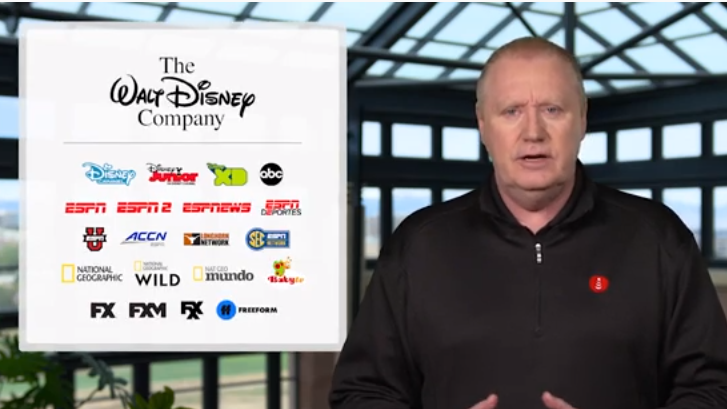Disney Networks Blacked Out on Dish Network, Sling TV
Dish accuses Disney of 'prioritizing greed'

The smarter way to stay on top of broadcasting and cable industry. Sign up below
You are now subscribed
Your newsletter sign-up was successful
The Walt Disney Co.’s portfolio of cable networks and owned local stations were blacked out to customers of Dish Network and Sling TV Saturday morning when a new distribution contract could not be reached.
Dish claimed on its website that Disney is seeking to make Dish subscribers pay nearly $1 billion more for its channels than they currently pay.
The blackout affects nearly 10 million households, including 7.8 million satellite customers and 2.2 million homes that stream with Sling TV.
The dispute comes at a time when Disney — like many other media companies — is prioritizing its direct-to-consumer streaming services over traditional pay TV channels. That trend is accelerating cord cutting. According to one analysis, the number of pay TV subscribers fell 6.1% in the second quarter.
Dish is no stranger to carriage disputes. This week it ended a three-week blackout with Game Show Network.
A Disney blackout is a much bigger deal, affecting channels including ESPN, which alone costs distributors more than $8 per subscriber per month, the most of any cable network.
Dish has been shedding customers who consider themselves sports fans by no longer carrying regional sports networks, another expensive programming source. It currently offers some packages that do not include ESPN and ESPN2, but said Disney was looking to force customers with those packages to pay for ESPN.
The smarter way to stay on top of broadcasting and cable industry. Sign up below
Dish accused Disney of taking advantage of its size to demand unreasonable rates for its programming and said it was preying on rural customers with no alternative to satellite (without mentioning DirecTV).
“Disney has exploited its market position to increase fees without regard for the public viewing experience,” Brian Neylon, executive VP and group president of Dish TV, said in a statement. “Clearly, Disney insists on prioritizing greed above American viewers, especially sports fans and families with children who watch their content.”
Dish noted that Disney was spending billions on Disney Plus and ESPN Plus, which are not included in Dish and Sling subscriptions.
“After months of negotiating in good faith, Dish has declined to reach a fair, market-based agreement with us for continued distribution of our networks. As a result, their Dish and Sling TV subscribers have lost access to our unrivaled portfolio of live sports and news plus kids, family and general entertainment programming,” Disney said in a statement. "The rates and terms we are seeking reflect the marketplace and have been the foundation for numerous successful deals with pay TV providers of all types and sizes across the country. We’re committed to reaching a fair resolution, and we urge Dish to work with us in order to minimize the disruption to their customers."
Affected are the ABC Owned Television Stations in seven markets, the ESPN networks, the Disney-branded channels, Freeform, the FX networks, the National Geographic channels and BabyTV.
On its website Dish said that it offered an extension to keep Disney's local station in Raleigh, N.C., available to viewers, but Disney wouldn't agree to that. "They took away important weather and local news from our customers in this area at a critical time," Dish said.
"We will continue to negotiate to provide the best value for our customers. We want to provide customers with fair rates, reliable service and the freedom of choice to pay for the channels they watch most,” said Gary Schanman, executive VP and group president, Sling TV. “Disney is an important long-term partner for us, and we hope they will be reasonable in their demands so we can reach a fair agreement and bring our customers' channels back as quickly as possible.” ■
Jon has been business editor of Broadcasting+Cable since 2010. He focuses on revenue-generating activities, including advertising and distribution, as well as executive intrigue and merger and acquisition activity. Just about any story is fair game, if a dollar sign can make its way into the article. Before B+C, Jon covered the industry for TVWeek, Cable World, Electronic Media, Advertising Age and The New York Post. A native New Yorker, Jon is hiding in plain sight in the suburbs of Chicago.

